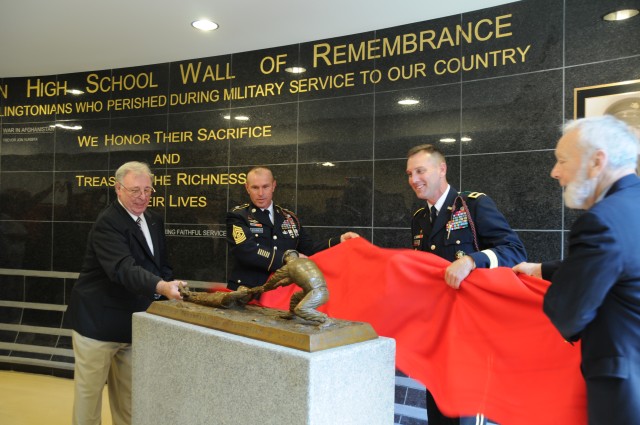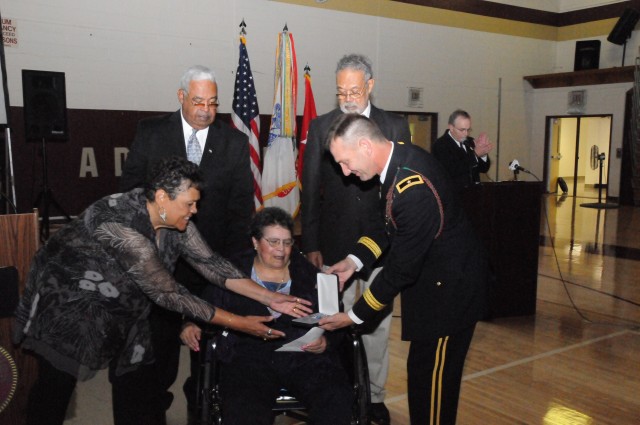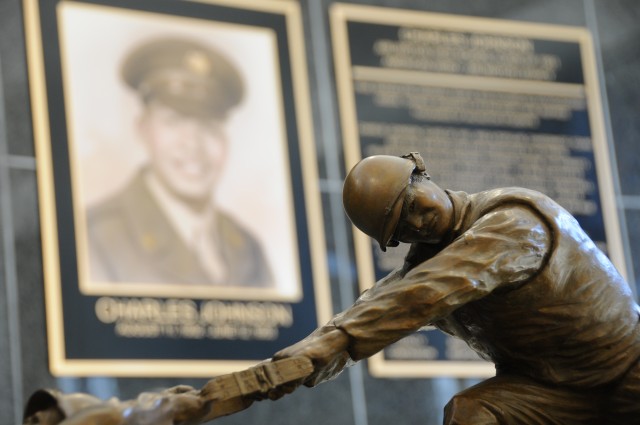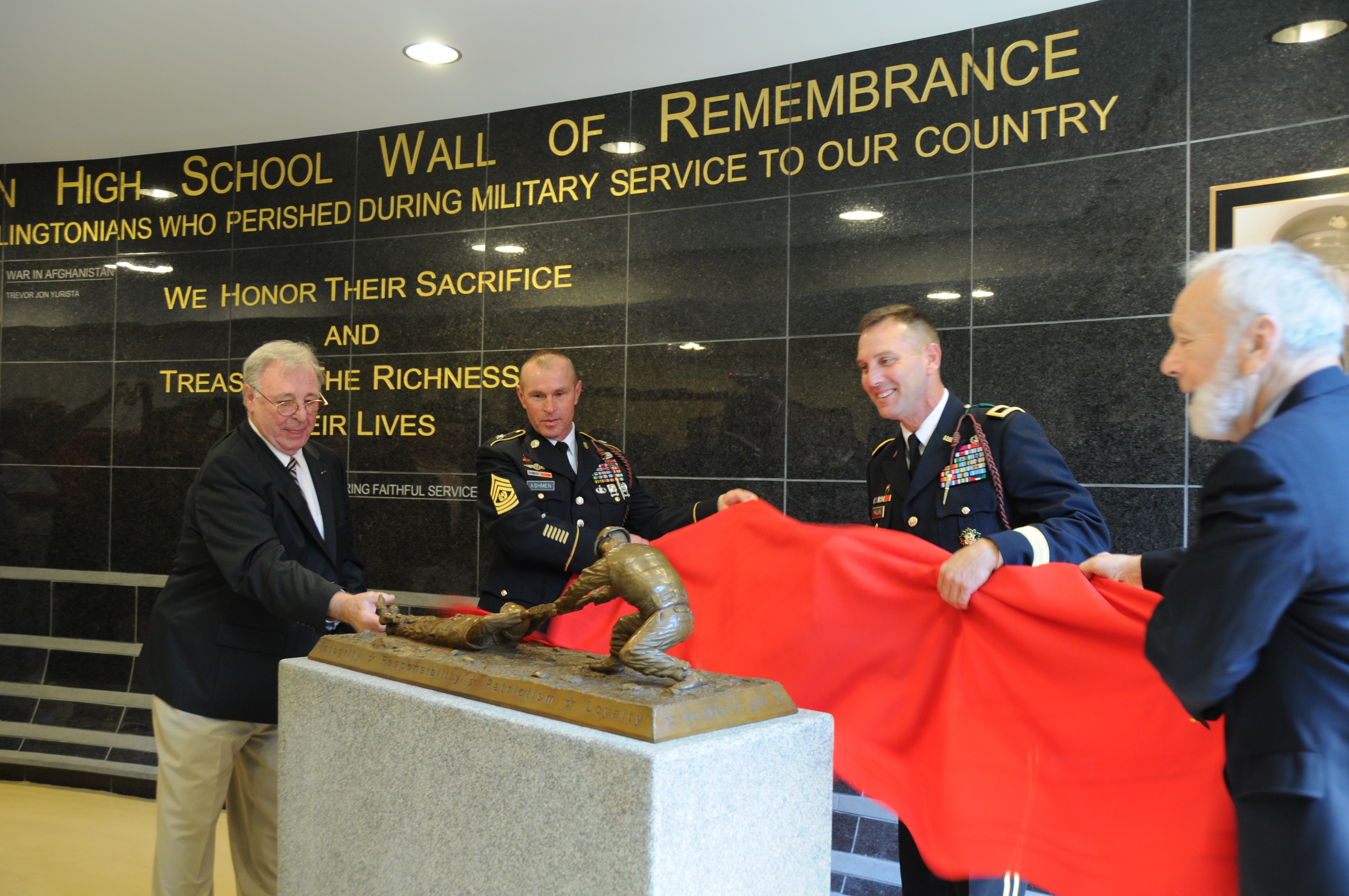FREEDOM PLAINS, N.Y. -- Approximately 1,000 Veterans, Family Members and well wishers gathered at the Arlington High School gymnasium to pay tribute to one of their own, Pfc. Charlie Johnson - star athlete, musician and, now, decorated war hero.
Brigadier General Jeffrey Phillips, 3rd Infantry Division deputy commanding general-rear, presented Pfc. Charlie Johnson, posthumously, with the Silver Star, the nation's third-highest medal for valor in combat. The Silver Star is awarded for gallantry in action against an enemy of the United States. Private First Class Johnson, a Browning automatic rifleman with the 15th Infantry Regiment, 3rd ID, was killed in action June 12, 1953, after an eight-day battle at Outpost Harry, in the Choran Valley during the Korean War. During the battle, Pfc. Johnson placed himself between his comrades and the enemy, creating the conditions for their successful rescue.
Brigadier General Phillips honored Pfc. Johnson in a speech commemorating Johnson's memory.
"Charlie Johnson - Soldier, American citizen - was a brother. His memory is a memory of brotherhood; you need not wear a uniform to accept that," said Brig. Gen. Phillips. "In a terrible night, June 12, 1953, Charlie had a lot of decisions to make - Charlie took action, his values guided him, and he got his buddies to safety."
Ironically, Pfc. Johnson and the Soldier whose life he saved were former high school classmates.
"Charlie (Johnson) was a most valiant Soldier," said Donald Dingee, who served alongside Pfc. Johnson in Company B, 15th Infantry Regiment, and 3rd ID, in the Republic of Korea. The teary-eyed Dog Face Soldier clenched his carved bald eagle handled cane with an embossed Marne patch on its shaft, as he recalled the day Pfc. Johnson, his Arlington High School classmate, saved his life.
"Charlie saved my life not once but twice that day," he said. "The front of fox hole was hit and Charlie pulled me to safety before he ran off to save more Soldiers. Charlie was the fifth Soldier I found after the battle had ended. I don't remember much after finding Charlie face-down after the fighting; I was in shock."
For decades, Dingee earnestly raised money for a memorial and campaigned for a medal to honor the Soldier who demonstrated selfless acts of bravery, which ultimately saved his life and the lives of several other Soldiers.
In a letter to Jaunita Mendez, sister of Pfc. Johnson, Brig. Gen. Phillips wrote, "Charlie Johnson's friends never forgot what he had done for them and for his America. It is an honor to pledge, on behalf of a grateful nation, that his fidelity to the Constitution and the citizens he so valiantly served will be remembered as the most profound gift of a patriot's great heart."
"There are no words to express how touching this has been, and how grateful we are as a Family," Mendez, Pfc. Johnson's youngest sister.
After the two-hour ceremony, visitors and Family Members gathered in the newly-dedicated Johnson Hall and the Wall of Remembrance for the unveiling of a Bronze statue, bearing the likeness of Dingee being dragged to safety by Pfc. Johnson. That was followed by a luncheon and viewing of the movie, "Hold At All Costs," about the battle of Outpost Harry.
Private First Class Johnson was born in Sharon, Conn., Aug. 11, 1932 and aspired to become a college football player.
"He was a heck of a (football) player," said Dingee. Private First Class Johnson transferred from Millbrook High School, NY., to Arlington High School, NY., in 1950, with hopes of seeking more exposure as a football player because, according to Dingee, Arlington High School had a better football program, added Dingee.
"Charlie could do almost anything," Dingee said. "Besides football, he played a mean trumpet, and was even on the school track team. He threw the shot put and discus and would beat everyone and didn't even practice."
Private First Class Johnson's dream ended almost as quickly as they began, as his aspirations to attend college and become a college football player were cut short due to financial shortcomings. After his partial scholarship to Howard University ended, he could no longer afford to continue college.
Soon after leaving college, Pfc. Johnson entered the Army in 1952 and attended Basic Training at Camp Breckinridge in Morganfield, Ky., before heading to war in Korea in the spring of 1953.
On June 12, 1953, Pfc. Johnson was killed in action on Outpost Harry in the "Iron Triangle" area, approximately 60 miles north of Seoul, Korea.






Social Sharing